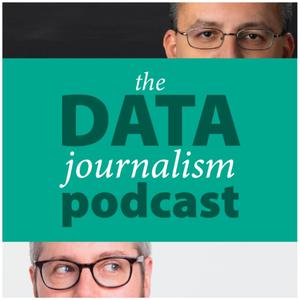
The PolicyViz Podcast
The PolicyViz Podcast
Jon Schwabish | Economist, Data Visualization, and Presentation Specialist
- 35 minutes 35 secondsUnlocking Data Communication: Unleashing the Power of R with David Keyes
The PolicyViz Podcast wraps up 2024 with David Keyes, author of the new book, R for the Rest of Us: A Statistics-Free Introduction! We not only talk about how you can get started in R using David’s book, but also building data and data visualization workflows with R, RMarkdown, and Quarto. We also talk about how to create consistent visualizations through themes and functions in R to help new R users leverage its features without being intimidated by complex statistics.
I hope you enjoy this episode and have a great holiday season! See you in 2025!!
Keywords: data, data visualization, PolicyVizPodcast, JonSchwabish, DavidKeyes, RForTheRestOfUs, DataCommunication, DataVisualization, Quarto, RMarkdown, DataPresentation, BrandedVisualizations, Excel, SelfTaughtR, QuantitativeEvaluation, ChatGPT, QualitativeDataAnalysis, TablesInR, EfficiencyInR, SPSS, SAS, Stata, ggplot, ReproducibleResearch, BeginnerFriendlyR, QuartoVsRMarkdown, SurveyDataAutomation, Netlify, DataManagementWorkflow, LearningR, mathematics, Al, machine learning
Subscribe to the PolicyViz Podcast wherever you get your podcasts.
Become a patron of the PolicyViz Podcast for as little as a buck a month
Check out David’s website and podcast, and grab his book R for the Rest of Us on Amazon
Follow me on Instagram, LinkedIn, Substack, Twitter, Website, YouTube
Email: [email protected]
18 December 2024, 5:05 am - 43 minutes 31 secondsCaptivating Minds: The Science of Storytelling and Attention in a Distracted World with John Medina
I’ve been super excited for this episode of the podcast for a while! This week, I speak with John Medina, author of one of my favorite books on the brain—Brain Rules! John and I talk about brain science generally and also dive into some specific aspects that are particularly important to the work of any data communicator: the importance of capturing and maintaining audience attention during presentations, emotional engagement as a way to counteract boredom and stress, and how stories can be a powerful tool for enhancing audience connection and retention. You’ll learn how the brain prioritizes meaning over details, driven by survival instincts, and how storytelling effectively taps into these instincts by involving emotional elements.
Keywords: data, data visualization, BrainRules, AudienceAttention, PresentationSkills, 10MinuteRule, EmotionalEngagement, StorytellingPower, NarrativeConnection, SurvivalInstincts, MikeGonzagaResearch, EpisodicMemory, DataVisualization, ScientificPresentations, RecallImprovement, SkepticismInScience, TheoryOfMind, MultitaskingMyth, LearningEfficiency, TechnologyDistractions, VisualMemory, AugmentedRealityEducation, VirtualRealityEducation, MentalHealthAwareness, ClimateChangeImpact, EconomicStress, PsychiatricDisorders, StressManagement
Subscribe to the PolicyViz Podcast wherever you get your podcasts.
Become a patron of the PolicyViz Podcast for as little as a buck a month
Check out John’s amazing book, Brain Rules, and visit the Brain Rules website for more great resources!
Follow me on Instagram, LinkedIn, Substack, Twitter, Website, YouTube
Email: [email protected]
4 December 2024, 5:05 am - 35 minutes 16 secondsMastering the Art of Executive Presence with Dr. Laura Sicola: Transforming Technical Expertise into Compelling Communication
Dr. Laura Sikola, a cognitive linguist and communications expert, visits the podcast to talk about how to be a better presenter and communicator. Laura’s work focuses on how to have better presence, telling stories, and connecting with your audiences. We talk about communication challenges like the “expert’s curse” and how developing your “executive presence” can command attention and build rapport.
Keywords: data, data visualization, DrLauraSikola, CognitiveLinguist, CommunicationExpert, PresentationSkills, ITProfessionals, FinanceProfessionals, DataAnalytics, EffectiveCommunication, ExpertsCurse, Storytelling, AudienceConnection, ExecutivePresence, MutualUnderstanding, AudienceEngagement, ConfidenceInPresentations, SlideDesign, VocalQuality, PresentationDelivery, SelfAwareness, PublicSpeaking, ClearCommunication, ConcisePresentations, DataPresentation, EffectiveSlides, 200Rule, SlideDesignTips, PracticeAndPreparation, EngagingAudiences
Subscribe to the PolicyViz Podcast wherever you get your podcasts.
Become a patron of the PolicyViz Podcast for as little as a buck a month
Check out Laura’s website and watch her TED Talk, “Want to sound like a leader? Start by saying your name right”
Follow me on Instagram, LinkedIn, Substack, Twitter, Website, YouTube
Email: [email protected]
20 November 2024, 4:59 am - 34 minutes 35 secondsDesigning with Type: Ellen Lupton on Typography, Inclusivity, and Innovation
I’m so excited to welcome Ellen Lupton to the PolicyViz Podcast! Ellen Lupton is a designer, writer, and educator. The all-new edition of her bestselling book Thinking with Type launched in March 2024. Other books include Design Is Storytelling, Graphic Design Thinking, Health Design Thinking, and Extra Bold: A Feminist, Inclusive, Anti-Racist, Nonbinary Field Guide for Graphic Designers. She teaches in the Graphic Design MFA program at Maryland Institute College of Art in Baltimore (MICA), where she serves as the Betty Cooke and William O. Steinmetz Design Chair. She is Curator Emerita at Cooper Hewitt, Smithsonian Design Museum in New York City, where her exhibitions included Herbert Bayer: Bauhaus Master and The Senses: Design Beyond Vision.
Keywords: #EllenLupton, #Typography, #Design, #PolicyVizPodcast, #InclusiveDesign, #TypefaceVsFont, #DataVisualization, #ExtraBoldBook, #GraphicDesign, #Underrepresentation, #FintechDesign, #SocioeconomicImpact, #EducationalApproaches, #QualitativeResearch, #UserEngagement, #HumanCenteredDesign, #MICADesign, #BilingualProjects, #InstagramDesign, #TwitterDiscourse, #AIDesignConcerns, #BiasInAI, #AITypefaces, #UnderservedLanguages, #NewRailAlphabet, #FunctionalTypefaces, #WomenInDesign, #CalibriCritique, #TimesNewRoman, #ThinkingWithType, #DesignConcepts
Subscribe to the PolicyViz Podcast wherever you get your podcasts.
Become a patron of the PolicyViz Podcast for as little as a buck a month
Follow Ellen on Instagram and her website, and find her latest book, thinking with type on Amazon
Follow me on Instagram, LinkedIn, Substack, Twitter, Website, YouTube
Email: [email protected]
7 November 2024, 4:59 am - 34 minutes 56 secondsFlowers and Numbers: Natalia Kisileva's Journey of Creativity and Community
In this week’s episode, I interview Natalia Kisileva about her transition from engineering to data visualization and her work in data art and physicalization. We discuss her great Substack newsletter “Flowers and Numbers” and how she shifted her focus to data art, fostering community-building efforts, after the pandemic. Natalia emphasizes making data accessible through tangible experiences and highlights the importance of community, particularly in initiatives like a Telegram group for women learning interactive visualizations. Our conversation explores the relationship between physical and digital data art, and Natalia advocates for creative visualizations to engage audiences emotionally and enhance communication. Learn more about Natalia’s work and how you can bring data art and data physicalization into your own work!
Keywords: PolicyVizPodcast, JonSchwabish, NataliaKisileva, EngineeringToDataVisualization, DataArt, Physicalization, FlowersAndNumbers, PandemicShift, CommunityBuilding, TangibleData, DataAccessibility, TelegramGroup, WomenInVisualization, InteractiveVisualizations, PhysicalVsDigital, CreativeVisualizations, EmotionalEngagement, CorporateCommunication, ArtisticDataPresentations, InPersonInteractions, 3DPrinting, TravelInspiredArt, MothersExperiences, StrengthAndBravery, SupportiveCommunity, NewsletterEngagement
Subscribe to the PolicyViz Podcast wherever you get your podcasts.
Become a patron of the PolicyViz Podcast for as little as a buck a month
Sign up for Natalia’s Flowers and Numbers newsletter and check out her website.
Follow me on Instagram, LinkedIn, Substack, Twitter, Website, YouTube
Email: [email protected]
23 October 2024, 3:59 am - 37 minutes 52 secondsZach Bowders on Data-Driven Design: Navigating Inspiration, Innovation, and Client Collaboration
In this episode of the PolicyViz Podcast, I talk with Zach Bowders on the intricacies of data visualization, the impact of dashboards on decision-making, and the fine line between plagiarism and inspiration. We discuss the importance of context-driven visualization choices over rigid adherence to traditional formats and highlight the need for flexibility. Our conversation stresses the balance between complexity and user familiarity, the value of learning from failures, and the necessity of client engagement to accurately meet their needs. We also talk about the challenges inherent in building trust with clients, sharing sensitive information, and the implications of changes to the Tableau public license for small nonprofits.
Keywords: PolicyVizPodcast, DataVisualization, JohnSchwabisch, ZachBauders, Dashboards, DecisionMaking, PlagiarismVsInspiration, TableauConference, InnovationInDataViz, FlexibilityInDesign, ContextDrivenChoices, VisualizationMethods, LearningFromFailures, DashboardDesign, ClientEngagement, StJudeResearch, TerminologyPrecision, ClientTrust, SensitiveData, TableauPublicLicense, Nonprofits, OriginalityInDesign, CitingInspiration, AttributionGuidelines, SkillDevelopment, ContinuousLearning, TechnicalSkills, SoftSkills, DataPlusLovePodcast, PodcastEpisode, CreativeFields, DataVisualizationChallenges, mathematics, Al, machine learning
Subscribe to the PolicyViz Podcast wherever you get your podcasts.
Become a patron of the PolicyViz Podcast for as little as a buck a month
Follow Zach on Twitter and find his podcast Data+Love on Spotify
Follow me on Instagram, LinkedIn, Substack, Twitter, Website, YouTube
Email: [email protected]
9 October 2024, 3:58 am - 39 minutes 6 secondsEmpathy and Inequality: Unpacking America's DIY Safety Net with Jessica Calarco
On this week’s episode, I talk with Jessica Calarco about her book “Holding It Together: How Women Became America’s Safety Net” and the role of qualitative data in research and data visualization. Calarco, a sociologist from UW Madison, discusses her research on family life inequalities and the shift to a “DIY society,” where individuals, particularly women, manage risks without government support, leading to reliance on low-wage caregiving. She critiques the wealthy elite for discouraging collective social support and emphasizes the need for policy changes to ensure basic needs, caregiving opportunities, and work-life balance through measures like paid family leave. We also talk about Jessica’s data collection efforts, which involved more than 400 hours of interviews, surveys, and national studies, to understand human experiences deeply. She addresses critiques of qualitative research’s representativeness, arguing its strength lies in capturing life’s complexities.
Keywords: data, data visualization, flourish, jessica calarco, holding it together, safety net, DIY, data analysis, qualitative data, qualitative data analysis, qualitative data analysis - coding and developing themes, machine learning, nvivo, dedoose, ai, data scientist, qualitative data analysis thematic analysis, qualitative data collection, university of wisconsin, data analyst, data science, machine learning for beginners
Subscribe to the PolicyViz Podcast wherever you get your podcasts.
Become a patron of the PolicyViz Podcast for as little as a buck a month
Visit Jessica’s website and find her book “Holding it Together” on Amazon
Follow me on Instagram, LinkedIn, Substack, Twitter, Website, YouTube
Email: [email protected]
25 September 2024, 3:59 am - 35 minutes 17 secondsVisual Narratives: The Art and Craft of Data with Federica Fragapane
Welcome to Season 11 of the PolicyViz Podcast! After a relaxing summer full of travel and reading and fun, I’m ready to kick off a whole new season of the show. To kick off this season, I’m excited to be joined by Federica Fragapane, an independent designer known for her intricate and beautiful data visualizations. Our conversation delves into her creative process, the tools she uses, and where she finds inspiration. Fragapane, with a Master’s degree in visualization design and experience at Accurat Studio, integrates data into her bespoke visualizations that convey deeper narratives, particularly human experiences and environmental issues. She prefers organic shapes to reflect the living presence behind data, emphasizing beauty, context, audience, and accessibility.
Keywords: data, data visualization, flourish, graphic design, how to, information design, graphic design tutorials, graphic design portfolio, graphic design course, online learning, graphic design photoshop, graphic design trends 2024, how to draw, data scientist, Federica fragapane, accurat, AccessibilityInDesign, EngagingVisuals, Inspiration, DataNarratives, VisualizationDesign, InstagramPortfolio, BehancePortfolio, mathematics, Al, machine learning
Subscribe to the PolicyViz Podcast wherever you get your podcasts.
Become a patron of the PolicyViz Podcast for as little as a buck a month
Check out Federica's Behance portfolio and follow her on Instagram.
Follow me on Instagram, LinkedIn, Substack, Twitter, Website, YouTube
Email: [email protected]
11 September 2024, 3:59 am - 37 minutes 50 secondsBridging Data Gaps: Nancy Organ on Making Data Visualization Accessible for All Ages
In this final episode of the season, I welcome Nancy Organ to the show to discuss her new book Data Visualization for People of All Ages. Nancy’s book aims to make dataviz accessible to everyday readers. Our conversation highlights the importance of not altering data simply for aesthetics but to facilitate understanding. We also explore balancing creativity with informed design choices, and suggest alternatives to traditional graphs, such as infographics, timelines, flowcharts, and diagrams.
Keywords: data, dataviz, data visualization, data visualization, bridging data gaps: nancy organ, data gaps: nancy organ on making data visualization, data visualization accessible for all ages, data visualization, data analytics, data analyst, business intelligence, professional certificate program, what is data analytics, jon schwabish, accessible for all ages, chair yoga, nancy organ, nancy organ on making data, data visualization python, data visualization examples, bar graph, data architecture, mathematics, Al, machine learning
Subscribe to PolicyViz Podcast wherever you get your podcasts.
Become a patron of the PolicyViz Podcast for as little as a buck a month
Follow Nancy on Twitter and find her book “Data Visualization for People of All Ages” on Amazon
Follow me on Instagram, LinkedIn, Substack, Twitter, Website, YouTube
Email: [email protected]
25 June 2024, 11:31 pm - 41 minutes 11 secondsData with Heart: Giorgia Lupi's Journey from Visualization to Human Connection
Georgia Lupi joins the show to discuss her work in data visualization, her journey from Accurat to Pentagram, and how she takes a human-centric perspective to working with and communicating data. Our conversation also focuses on her new book, “This is Me and Only Me.” The book encourages kids to observe and collect data to understand emotions and human questions, using symbols and colors to express emotions. Giorgia hopes the book will inspire kids and adults to be imaginative, observant, and mindful. We also have some breaking news on this episode because Giorgia is working on another big project, a new book called “Speak Data” that explores data as a language intersecting various fields.
Keywords: data with heart giorgia lupi’s journey from visualization, heart giorgia lupi’s journey from visualization, giorgia lupi’s journey from visualization to human connection, lupi’s journey from visualization to human, heart giorgia lupi’s journey, data with heart giorgia lupi’s journey, giorgia lupi’s journey from visualization, giorgia lupi, dataviz, data visualization, human connection jon schwabish, jon schwabish, visualization, lupi’s journey, heart giorgia, mathematics, Al, machine learning
Subscribe to PolicyViz Podcast wherever you get your podcasts.
Become a patron of the PolicyViz Podcast for as little as a buck a month
Follow Giorgia on Twitterand find her book “This is Me and Only Me” on Amazon
Follow me on Instagram, LinkedIn, Substack, Twitter, Website, YouTube
Email: [email protected]
19 June 2024, 3:00 pm - 39 minutes 48 secondsDeconstructing Data: The Modular Information Design Handbook with Nicole
Nicole Lachenmeier and Darjan Hil’s new book, Visualizing Complexity: Modular Information Design Handbook, focuses on deconstructing data encodings into fundamental elements to create effective visualizations. They take an exciting and hands-on approach to data visualization design for their own work and how they teach design to others. In this week’s episode of the podcast, our conversation highlights Nicole and Darjan’s journey in data design and how they stress the importance of deliberate thinking, manual effort, and critical analysis in their design process.
Keywords: information design handbook, the modular information design handbook, information design, data visualization, information visualization, information design handbook with nicole, nicole hickl, design handbook with nicole lachenmeier and darjan hil, nicole lachenmeier and darjan hil, Design Handbook, design handbook, jim hall, junior designer tips, fuel filler, design resources, handbook with nicole lachenmeier, infographics, data design, data viz, infografik, infographics show, mathematics, Al, machine learning
Subscribe to PolicyViz Podcast wherever you get your podcasts.
Become a patron of the PolicyViz Podcast for as little as a buck a month
Follow Nicole Lachenmeier and Darjan Hilon Instagram and find their new book her book “Visualizing Complexity: Modular Information Design Handbook" on Amazon
Follow me on Instagram, LinkedIn, Substack, Twitter, Website, YouTube
Email: [email protected]
12 June 2024, 2:00 pm - More Episodes? Get the App
Your feedback is valuable to us. Should you encounter any bugs, glitches, lack of functionality or other problems, please email us on [email protected] or join Moon.FM Telegram Group where you can talk directly to the dev team who are happy to answer any queries.
 DataFramed
DataFramed
 Data Viz Today
Data Viz Today
 The Data Journalism Podcast
The Data Journalism Podcast
 More or Less: Behind the Stats
More or Less: Behind the Stats
 Design Matters with Debbie Millman
Design Matters with Debbie Millman
 Freakonomics Radio
Freakonomics Radio